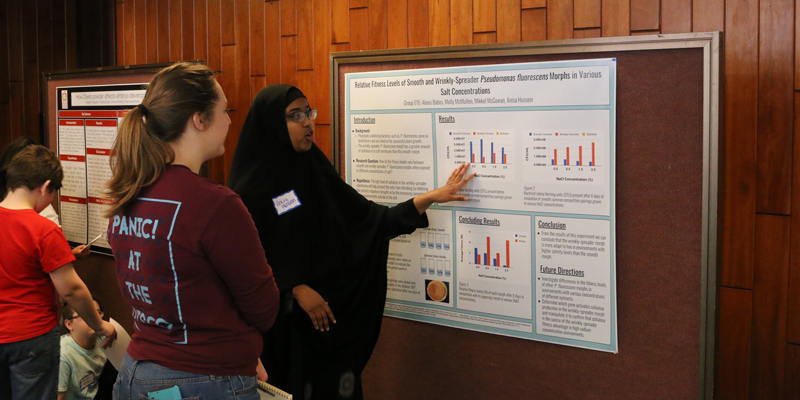Elementary and middle school students and Foundations of Biology undergraduates swapped research findings at a recent poster session day.

InSciEd Out, the organization aiming to encourage K-12 students to explore STEM in the classroom and beyond through experiential learning, recently hosted its first-annual poster session in collaboration with undergraduate volunteers from the Foundations of Biology courses. As part of the poster session, students from Moreland Elementary and Heritage E-STEM middle school had the chance to share their research posters with students and guests, while also seeing the kind of research undergraduates get to take part in as well. We recently caught up with Seth Thompson, research and program associate for InSciEd Out, to hear more about the poster session.
What did you hope students would get out of the poster session experience?
My main hope is that students got an opportunity to share their science in a voice that is authentic to scientific discourse. Many of the students that we serve come from groups that are traditionally underrepresented in science, and it’s important that they get to see that their voice is valuable and that they have something to contribute to scientific conversations. Our partnership adds authenticity to this experience for students because they are presenting to other scientists including undergraduate researchers and faculty mentors. We support the students as they “try on the voice of a scientist” and hope that this experience helps develop their science identity and confidence in doing science themselves.
How do you see this research and presentation process helping students in their interest and knowledge of STEM fields?
I think something that is pretty unique about our program is that students get to experience the entire process of science. This research and presentation cycle is a big part of that. Students get to ask their own questions, design their own experiments, and collect their own data, all with the support of trained scientists. They ask authentic, novel questions and that helps students experience the feeling of generating knowledge rather than consuming it. I think that’s a pretty powerful experience and one that I hope translates to increased interest in STEM and a greater appreciation for evidenced-based decision making and critical thinking.
Do you have any similar projects coming up?
We do have a very similar experience planned for the teachers that are participating in our professional development program this summer (early August). We will ask the teachers to live the experience they will facilitate with their students, meaning they will participate in the full process of science from question generation to results presentation as well. We will host a poster session and invite members of their school community as well as members of the UMN community to attend that session. Each of our partner schools do their own local version of a presentation day.